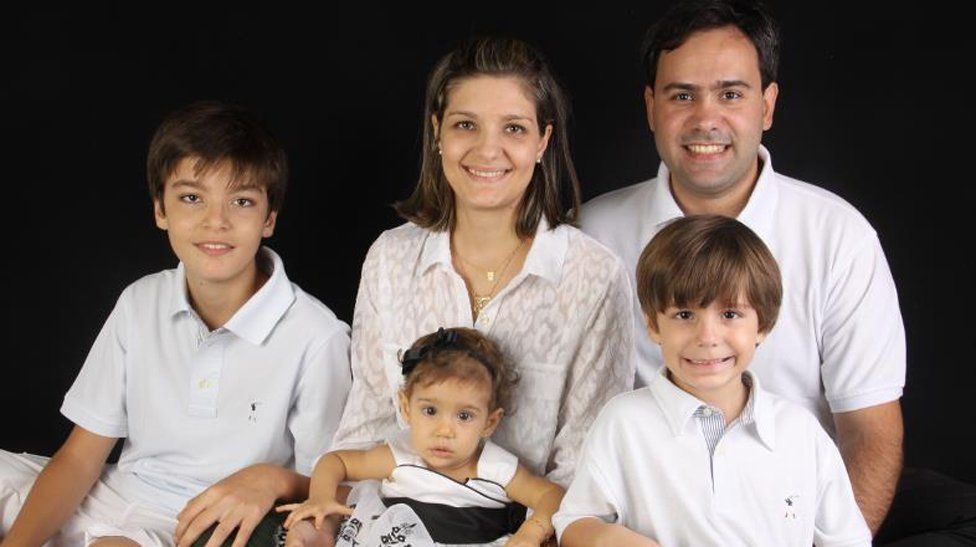Brazil Caesareans: Battle for natural childbirth
- Published

Brazil has the highest rate of Caesarean sections in the world.
Eighty-five per cent of all births in private hospitals are Caesareans, while in public hospitals the figure stands at 45%.
The World Health Organization says Caesareans should only be carried out when medically necessary. It suggests no limit, but in recent years between 10% and 15% of births has been considered an "ideal rate".
The reasons behind Brazil's staggeringly high rate of Caesareans are varied, and range from a lack of information among many pregnant women to a preference among some doctors to carry out the surgical procedure.
In July, new rules came into force across the country aimed at reducing the rate.
Advocates of natural childbirth welcomed the move but pointed to the fact that those women who wanted to give birth naturally often encountered scepticism or even outright hostility from the medical profession.
BBC Brasil's Mariana Della Barba spoke to mother-of-four Monica Chiodi Toscano de Campos about her experience.
"I was 15 when I got pregnant for the first time," she said. "When my waters broke, the doctor said I needed an emergency Caesarean section.
"To be honest, I had no clue about what was going on. At the time I had no choice but to trust him.
"He told me my baby was 38 weeks old, but he was not, he was just 36 weeks.
"Danilo was born with respiratory distress, developed pneumonia and went straight into the intensive care unit. He eventually got better, but I knew that he was not ready to be born.
Reasons behind Brazil's high rate of C-sections
- Obstetricians in private hospitals get paid for the service provided and not for the hours worked. Many prefer carrying out a quick C-section to assisting in lengthy vaginal births
- Experts say there is a lack of information among pregnant women in Brazil about the pros of natural births and the risks of C-sections
- According to research by the Perseu Abramo research foundation, one in four women reported suffering obstetric violence when giving birth, including having their legs tied during labour, not being allowed to walk about freely or not being allowed to eat
- Negative experiences such as not being provided with anaesthetics or an epidural when requested prompt many women to opt for C-sections
"During my second pregnancy, I hoped for a natural birth. I was a nurse by then and I had seen a lot of obstetric violence in hospitals.
"I saw women giving birth tied to their beds, to prevent them from getting up and walking. Many were also denied the presence of their husbands.
"I witnessed other nurses or interns insulting women while they were having contractions. 'When you were making the baby you didn't complain,' they would tell them if they screamed.
"I also saw a lot of unnecessary episiotomies [incisions in the perineum] being made, and I thought that was the norm for natural births.
"So when the doctor told me I had a placenta problem and without an emergency Caesarean my baby would face foetal distress, I did not question his advice.
"Also, in Brazil there is a strong belief in 'once a C-section, always have a a C-section', so Pedro was born at 38 weeks by Caesarean. Again, in my view, an unnecessary one.
"By the time I was pregnant with my third child, I knew it did not have to be this way. I did a lot of research into vaginal births after two Caesareans but could not find a doctor willing to assist me.
"I went into labour at 38 weeks and 3 days. At the hospital, the doctor on duty told me that after having had two Caesareans, she would perform another one.
"She told me that I shouldn't even have gone into labour, because it was too risky.
"Alice was born by a C-section and I missed out yet again on my dream of having a natural birth.
"I did not think I would become pregnant again, but as soon as I did, I started to look for a medical team which would agree to help me have a vaginal birth.
"I found a younger doctor who was up to the challenge, even though he had never helped with a vaginal birth after three C-sections.
"We researched the international literature together as there was almost no material about it in Brazil.
"I went to the hospital just in the final stage of labour and tried to be as quiet as possible. I could not take the chance of someone interfering with or questioning my doctor.
"I had been told some people thought I was crazy for wanting a natural birth and accused me of putting my unborn son's life at risk.
"But after a few moments and a really big push, Jose was born.
"He was immediately handed to me and started to breastfeed straight away. And he stayed there for a long time, close to me.
"I felt like through his birth I, too, had been born again."
- Published7 July 2015
- Published11 September 2015